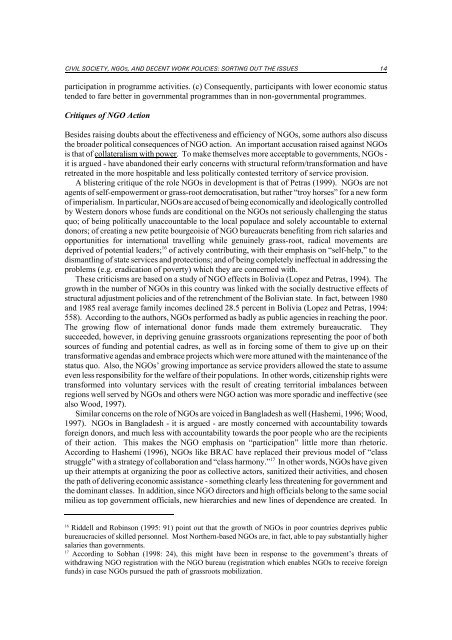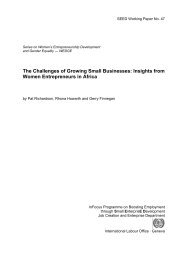Civil Society, NGOs, and Decent Work Policies: Sorting out the Issues
Civil Society, NGOs, and Decent Work Policies: Sorting out the Issues
Civil Society, NGOs, and Decent Work Policies: Sorting out the Issues
Create successful ePaper yourself
Turn your PDF publications into a flip-book with our unique Google optimized e-Paper software.
CIVIL SOCIETY, NGOS, AND DECENT WORK POLICIES: SORTING OUT THE ISSUES 14<br />
participation in programme activities. (c) Consequently, participants with lower economic status<br />
tended to fare better in governmental programmes than in non-governmental programmes.<br />
Critiques of NGO Action<br />
Besides raising doubts ab<strong>out</strong> <strong>the</strong> effectiveness <strong>and</strong> efficiency of <strong>NGOs</strong>, some authors also discuss<br />
<strong>the</strong> broader political consequences of NGO action. An important accusation raised against <strong>NGOs</strong><br />
is that of collateralism with power. To make <strong>the</strong>mselves more acceptable to governments, <strong>NGOs</strong> -<br />
it is argued - have ab<strong>and</strong>oned <strong>the</strong>ir early concerns with structural reform/transformation <strong>and</strong> have<br />
retreated in <strong>the</strong> more hospitable <strong>and</strong> less politically contested territory of service provision.<br />
A blistering critique of <strong>the</strong> role <strong>NGOs</strong> in development is that of Petras (1999). <strong>NGOs</strong> are not<br />
agents of self-empowerment or grass-root democratisation, but ra<strong>the</strong>r “troy horses” for a new form<br />
of imperialism. In particular, <strong>NGOs</strong> are accused of being economically <strong>and</strong> ideologically controlled<br />
by Western donors whose funds are conditional on <strong>the</strong> <strong>NGOs</strong> not seriously challenging <strong>the</strong> status<br />
quo; of being politically unaccountable to <strong>the</strong> local populace <strong>and</strong> solely accountable to external<br />
donors; of creating a new petite bourgeoisie of NGO bureaucrats benefiting from rich salaries <strong>and</strong><br />
opportunities for international travelling while genuinely grass-root, radical movements are<br />
deprived of potential leaders; 16 of actively contributing, with <strong>the</strong>ir emphasis on “self-help,” to <strong>the</strong><br />
dismantling of state services <strong>and</strong> protections; <strong>and</strong> of being completely ineffectual in addressing <strong>the</strong><br />
problems (e.g. eradication of poverty) which <strong>the</strong>y are concerned with.<br />
These criticisms are based on a study of NGO effects in Bolivia (Lopez <strong>and</strong> Petras, 1994). The<br />
growth in <strong>the</strong> number of <strong>NGOs</strong> in this country was linked with <strong>the</strong> socially destructive effects of<br />
structural adjustment policies <strong>and</strong> of <strong>the</strong> retrenchment of <strong>the</strong> Bolivian state. In fact, between 1980<br />
<strong>and</strong> 1985 real average family incomes declined 28.5 percent in Bolivia (Lopez <strong>and</strong> Petras, 1994:<br />
558). According to <strong>the</strong> authors, <strong>NGOs</strong> performed as badly as public agencies in reaching <strong>the</strong> poor.<br />
The growing flow of international donor funds made <strong>the</strong>m extremely bureaucratic. They<br />
succeeded, however, in depriving genuine grassroots organizations representing <strong>the</strong> poor of both<br />
sources of funding <strong>and</strong> potential cadres, as well as in forcing some of <strong>the</strong>m to give up on <strong>the</strong>ir<br />
transformative agendas <strong>and</strong> embrace projects which were more attuned with <strong>the</strong> maintenance of <strong>the</strong><br />
status quo. Also, <strong>the</strong> <strong>NGOs</strong>’ growing importance as service providers allowed <strong>the</strong> state to assume<br />
even less responsibility for <strong>the</strong> welfare of <strong>the</strong>ir populations. In o<strong>the</strong>r words, citizenship rights were<br />
transformed into voluntary services with <strong>the</strong> result of creating territorial imbalances between<br />
regions well served by <strong>NGOs</strong> <strong>and</strong> o<strong>the</strong>rs were NGO action was more sporadic <strong>and</strong> ineffective (see<br />
also Wood, 1997).<br />
Similar concerns on <strong>the</strong> role of <strong>NGOs</strong> are voiced in Bangladesh as well (Hashemi, 1996; Wood,<br />
1997). <strong>NGOs</strong> in Bangladesh - it is argued - are mostly concerned with accountability towards<br />
foreign donors, <strong>and</strong> much less with accountability towards <strong>the</strong> poor people who are <strong>the</strong> recipients<br />
of <strong>the</strong>ir action. This makes <strong>the</strong> NGO emphasis on “participation” little more than rhetoric.<br />
According to Hashemi (1996), <strong>NGOs</strong> like BRAC have replaced <strong>the</strong>ir previous model of “class<br />
struggle” with a strategy of collaboration <strong>and</strong> “class harmony.” 17 In o<strong>the</strong>r words, <strong>NGOs</strong> have given<br />
up <strong>the</strong>ir attempts at organizing <strong>the</strong> poor as collective actors, sanitized <strong>the</strong>ir activities, <strong>and</strong> chosen<br />
<strong>the</strong> path of delivering economic assistance - something clearly less threatening for government <strong>and</strong><br />
<strong>the</strong> dominant classes. In addition, since NGO directors <strong>and</strong> high officials belong to <strong>the</strong> same social<br />
milieu as top government officials, new hierarchies <strong>and</strong> new lines of dependence are created. In<br />
16<br />
Riddell <strong>and</strong> Robinson (1995: 91) point <strong>out</strong> that <strong>the</strong> growth of <strong>NGOs</strong> in poor countries deprives public<br />
bureaucracies of skilled personnel. Most Nor<strong>the</strong>rn-based <strong>NGOs</strong> are, in fact, able to pay substantially higher<br />
salaries than governments.<br />
17<br />
According to Sobhan (1998: 24), this might have been in response to <strong>the</strong> government’s threats of<br />
withdrawing NGO registration with <strong>the</strong> NGO bureau (registration which enables <strong>NGOs</strong> to receive foreign<br />
funds) in case <strong>NGOs</strong> pursued <strong>the</strong> path of grassroots mobilization.
















